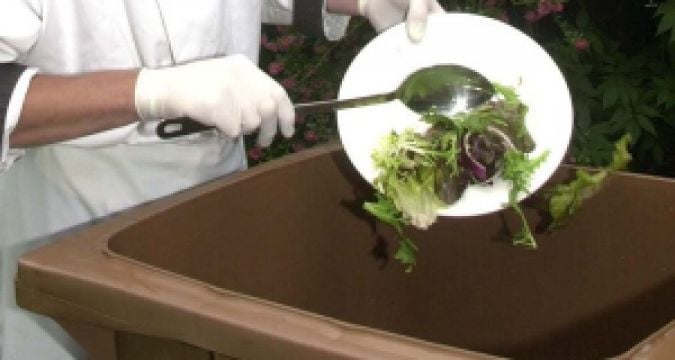Irish people are the 6th biggest wasters of food among EU citizens with an average of 145kg of food waste being generated annually per inhabitant in the Republic.
New figures published by the European Commission show food wastage levels in Ireland on a per capita basis were 10 per cent above the EU average of 132kg per inhabitant in 2022.
However, food businesses rather than householders are mostly responsible for the scale of the problem in the Republic.
Overall, the EU generated 59.2 million tonnes of food waste in 2022, including edible and inedible parts, with almost 750,000 tonnes accounted for by Ireland.
The latest figures show the annual amount of food waste among Irish people has been falling in recent years – down from an average of 154kg per head of population in 2020 to 145kg last year.
They also reveal that ordinary householders in Ireland are relatively very good at limiting the amount of food they waste compared to most other EU citizens.
Instead, they show that the level of food waste generated by manufacturers of food products in the Republic as well as restaurants and other food outlets are disproportionately high compared to their counterparts in other EU member states.
The figures highlight how the average householder in Ireland generated an average of just 43kg of food waste in 2022 – the third lowest level after Slovenia and Bulgaria with the EU average at 72kg per person.
Ordinary members of the public in Ireland account for just 30 per cent of all food waste generated in the country compared to the EU average of 55 per cent.
Unlike most other EU countries where householders are responsible for the largest share of food waste, the latest figures show food manufacturers in Ireland account for the biggest share of the problem at 31 per cent - representing an average of 45kg of food waste per inhabitant.
The rate of food waste by food companies in the Republic is the 5th highest in the EU.
Restaurants and other food outlets in Ireland accounted for 21 per cent of all food waste in the country in 2022, generating an annual average of 30kg per inhabitant.
It is the third highest rate for restaurants among the 27 EU member states after Malta and Cyprus but is down from 38kg per capita in 2021.
On average, restaurants are responsible for just 11 per cent of all food waste in the EU, or an average of 15kg per inhabitant.
The figures were released to coincide with International Day of Awareness of Food Loss and Waste on September 29th.
The European Commission pointed out that household food waste is slightly more than twice the amount of food waste generated by the combined sectors of primary production and manufactures of food products and beverages where strategies exist for reducing food waste.
Officials in Brussels claimed the impact of the end of the Covid-19 lockdowns on the contribution of restaurants and food outlets as well as retailers to food waste, at 11% and 8% respectively of the EU average, was still being analysed.
In Ireland, waste collection companies are obliged to provide a bio-waste or brown bin to all customers regardless of where in the country they live since January 1st 2024 as a result of the European Union (Household Food Waste and Bio-waste) Regulations 2023 coming into effect.
In July, the Minister for Communications, Climate Action and Environment, Eamon Ryan, said the expansion of the brown bin was being supported by a comprehensive education and awareness campaign.
“Household and commercial waste is one of the National Waste Enforcement Priorities for 2024. Therefore local authority waste enforcement efforts will be targeted towards ensuring that waste collectors are providing the service as required,” said Mr Ryan.







